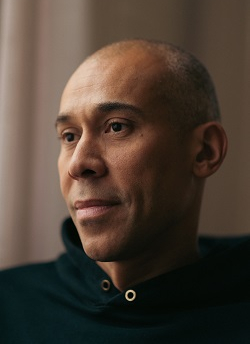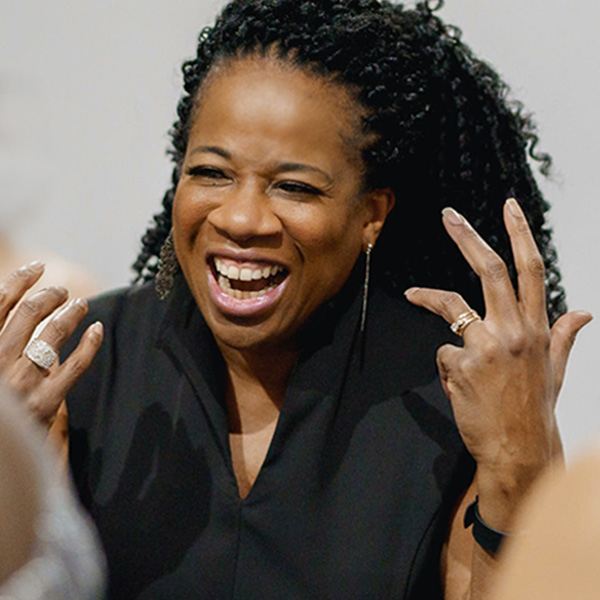Black Ice, a weighty new documentary directed by Hubert Davis, BA’00, explores a side and history of hockey that has remained largely under the radar in our hockey-obsessed nation.
The documentary examines anti-Black racism in hockey – past and present – and highlights the Colored Hockey League of the Maritimes and its contributions to the game.
“Hockey is something that really defines our experience of growing up in this country. And by examining hockey, I think we are examining ourselves,” Davis told the audience at the 2022 Toronto International Film Festival (TIFF) where Black Ice won the People’s Choice Documentary Award.

The film includes current and former NHL players, from Willie O’Ree, the first Black player in the league, to Wayne Simmonds, and P.K. Subban – as well as women involved in the game at elite levels such as two-time Olympic medalist Sarah Nurse and L.A. Kings scout Blake Bolden, the first Black woman to hold that position in the NHL.
Several share stories of racial slurs directed at them in hockey. Florida Panther forward Anthony Duclair recalled facing racist taunts as a youngster from a few parents from an opposing team before a minor hockey tournament final.
Devante Smith-Pelly, who played for several NHL teams including the Montreal Canadiens and the Washington Capitals with whom he won a Stanley Cup, talked about dealing with unconscious bias his entire career. “I’ve had coaches say, ‘Oh, your hockey IQ is actually pretty good’ and ‘Oh, you’re actually articulate’. Looking back…things that are crazy, that no one should have to deal with to be honest.”
Pro hockey player Akim Aliu figures prominently in the documentary. In 2019, he went public with allegations that then Calgary Flames head coach Bill Peters made racist remarks in the dressing room over Akim’s choice of music when both were with the Rockford IceHogs of the American Hockey League. Peters resigned from the Flames a few days later.
Davis says he was trying to capture the collective experience. “I didn’t want it to feel like it was one thing or another. It happened in very different forms. Sometimes it would be a fan incident, sometimes it would be a coach, sometimes it would be another player. Maybe it happens when you’re very young, sometimes it happened when players were established already in the NHL.”
Davis’s filmmaking career got off to an auspicious start. His debut film Hardwood about his father Mel Davis, a former Harlem Globetrotter, earned an Oscar nomination in 2005 for Best Documentary Short Subject.
He was initially hesitant about jumping on board when producer Vinay Virmani came to him with Black Ice, partly because he didn’t play hockey growing up. (Davis was an all-star varsity basketball player at McGill where he majored in cultural studies.) Davis’s bigger fear was whether they would be able to “get at the core of what we’re talking about – even though a lot of people don’t like talking about it.”
As it delves into the past, the documentary looks at the Colored Hockey League of the Maritimes, which launched in the late 19th century and dissolved in the 1930s. We hear from George and Darril Fosty who wrote Black Ice: The Lost History of the Colored Hockey League of the Maritimes, 1895-1925, and learn of innovations that emerged from the league, such as goalies dropping to make a save at a time when the rules required them to stand in net.
The film also includes the story of Herb Carnegie, who Davis notes should have been the Jackie Robinson of hockey. The star centre was the Quebec Senior Hockey League’s MVP three years running in the late 1940s, but never got to the NHL. Conn Smythe, the Toronto Maple Leafs owner at the time, is alleged to have said he would give anyone $10,000 who could turn Carnegie white. Carnegie received low-ball offers from the New York Rangers – half of what he was earning at the time – and turned them down. He was inducted posthumously into the Hockey Hall of Fame in 2022 in the builder category.
McGill political science professor Debra Thompson, Canada Research Chair in Racial Inequality in Democratic Societies, is a recurring voice in the film. She noted that the idea that racism exists in this country “is a hard pill to swallow” with Canadian multiculturalism, tolerance, and benevolence deeply embedded in our core understanding of our national identity. “It really goes against the grain of who we think we are,” said Thompson, the author of The Long Road Home: On Blackness and Belonging.
To Davis, the strength of hockey is also its weakness. “There is a real closed nature to it. And I think part of that is its strength because it’s those connections that people are building.” All the players expressed a deep love for the game and hockey culture “because that’s how they grew up. That’s how they fit in,” he says. However, because hockey is so prominent in the community if that power goes unchecked or isn’t transparent, it becomes very problematic, he adds.
Black Ice, which was named to TIFF’s Top Ten list of 2022’s best Canadian films, boasts some star power behind the camera. When Davis learned that LeBron James and Drake were on board as two of the executive producers, he knew it would help with the film’s reach. “You’re just trying to get as many people to see it and be part of the conversation as you can.”
His main goal with the film is he wanted the players to be seen, Davis says. “I wanted their experiences to be heard, so that there wasn’t a denial of the experience or a minimizing [of it].”
Black Ice premieres Thursday, February 2 at 9 pm ET on TSN, TSN.ca, the TSN app, and Crave, and will also be available in French on RDS and Crave.


